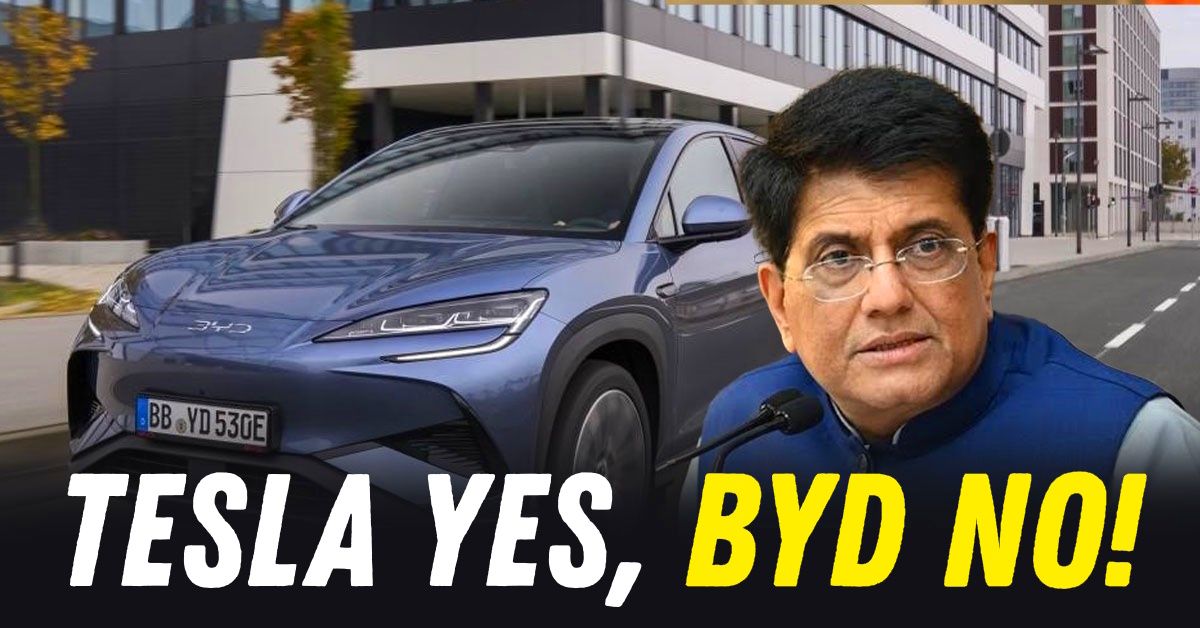India Won't Allow BYD's Electric Car Factory: Commerce Minister Piyush Goyal Explains Why


India has taken a strong stand. Chinese electric carmaker BYD will not be allowed to invest in the country — at least for now. Union Commerce Minister Piyush Goyal confirmed this recently. At the same time, India is inviting Elon Musk’s Tesla to enter the domestic market. The message is clear: our country is being careful about who it lets in, especially when it comes to China. The reason for this is the existing geopolitical tensions between the two nations.
Earlier in 2024, BYD wanted to invest $1 billion in India through a local partnership. The government said no. This was not just about business. The decision was made because of national security and strategic concerns.
This is not the first time a Chinese company was stopped. Great Wall Motors also exited India after facing the same issue — a lack of approval from authorities.
Speaking at the India Global Forum in Mumbai, Goyal said India has to be cautious. He made it clear that BYD is not welcome right now. He told Bloomberg TV, “As of now, it is a no.” This shows the government’s firm approach when it comes to investments from countries like China.
His comments came on the same day US President Donald Trump warned China of new import taxes. Global tensions are rising, and India seems to be staying alert.
Previously, the Chinese government had asked electric vehicle manufacturers to stop setting up factories and making investments in countries outside of China. In what seemed to be a protectionist move, China put out a strong advisory for EV makers, with these instructions. It wanted the state-of-the-art EV technology to remain within the country's borders, so that it maintains the EV leadership.
While BYD is being blocked, Tesla is being encouraged to come to India. The government is in talks with Elon Musk to bring Tesla cars to the country.
Tesla has shown interest in the past but stayed away because of high import taxes. India is now working on ways to make it easier for Tesla to set up locally. If that happens, Tesla could become a big player in India’s growing EV market.
India has one of the highest import duties on cars in the world. A fully built car brought into the country is taxed at 100%. In comparison, the US charges just 2.5%, Germany 10%, and China up to 25%.
These high taxes intend to safeguard Indian brands. Companies like Tata Motors and Mahindra & Mahindra have built strong EV lineups. They don’t want cheaper foreign cars, especially from China, entering the market and bringing down prices.
India wants to be a global hub for electric vehicle (EV) production. But opening up the market too much could hurt local companies. That’s why the government is careful.
At the same time, India is talking with the US and European Union to sign free trade deals (FTD). These could put pressure on India to lower import duties as well. But these would take time before being implemented.
India has made its position clear. Foreign companies are welcome — but only if their presence supports India’s long-term goals and the local economy. BYD’s investment does not fit into the plan right now. Tesla, on the other hand, could play a key role in shaping India’s EV future. The government wants to create a strong and self-reliant EV industry. For now, national interest and local protection are the top priorities.